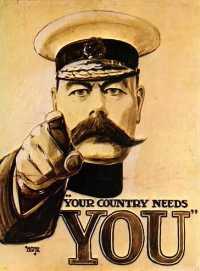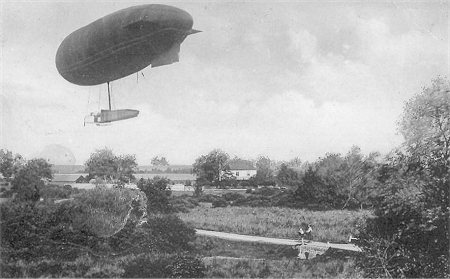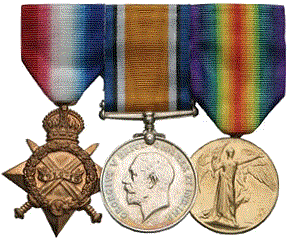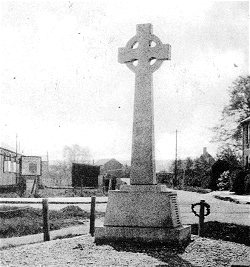 THE GREAT WAR
The War Memorial at the village crossroads stands in mute testimony to the sacrifice of the village in the two World Wars. 35 men from the village were killed in World War I and this from a place of barely 900 inhabitants at that time. The names represent a cross section of village society from titled landowners to labourers. Sir Philip and Lady Henriques of Normandy Park lost their only son during the war and there is a memorial window to him in St. Mark's Church. They always attended the annual Remembrance Service and laid a wreath by the War Memorial. Sir Philip was Assistant Financial Secretary in the Ministry of Munitions and he was knighted in 1918. Many of those who returned from the fighting had been wounded. Among them was Doug Roberts who was wounded on the Somme in 1918 and whose brother was killed. Doug, together with a dwindling number of veterans received belated recognition when he was invested with the Legion of Honour in 1998 when he was 98 years old. Samuel Lipscombe served with the Middlesex Regiment. George and Wilfred Sewry, the Normandy blacksmiths, joined up and served as farriers. George was wounded in the arm and was unable to resume his trade as blacksmith and worked at Henley Park Farm after he was discharged. Wilfred had a narrow escape from death when he was shot by a sniper at Ypres. The bullet passed through his open mouth knocking out one tooth and fracturing his jaw and then exited through his cheek. Dick Bosley won the Military Medal whilst serving in the army.
Many saw wide service including Colonel Lannoy John Coussmaker who was awarded a DSO and bar, an MC and the Croix de Guerre. His brother, Arthur Blakeney Coussmaker, had an even more adventurous war career. He was on special duties with the South Wales Borderers in France in 1915 but later in the year he was severely wounded. In 1918 he took part in the abortive operation in Russia in support of the White Faction and was a member of the expeditionary force in the Caucasus, known as "Dunsterforce", led by Major General Lionel C Dunsterville. Afterwards, in Siberia, he attempted to obtain a consignment of platinum but this was seized by the Bolsheviks. He was awarded the Military Cross in 1920. He was later to become the guardian and mentor of the young John Coussmaker after his father's death. In spite of the terrible conditions in the trenches there were lighter moments. Doug Roberts recalled that when a shell struck the trench he was in he turned round to see what he thought would be a gory mess where his colleague had been, but the concussion had split the tin his mate had been holding and he was covered in red jam.
Frail aircraft from Farnborough began to appear in the skies over Normandy village joining the airships remembered from before the war. The Coussmakers had Belgian refugees living in the old farmhouse of Glaziers. Henley Park House was used as a hospital during the war and Lady Roberts, the lessee, moved temporarily to Fox Lodge. After the war, Lady Roberts was instrumental in providing the village with its village hall, which she supported with the compensation she received from the War Office. There was a big effect locally. With many of the men on war service, the women found employment in jobs that were previously closed to them. Farmers were encouraged to be more productive but some of the Coussmaker family letters mention the difficulty in getting suitable replacements for the men who were away. Jobs were to be had at the Royal Aircraft Factory at Farnborough and in Aldershot, the home of the British Army. Many of the bus timetables were severely curtailed but those through the village between Aldershot and Guildford were maintained at pre-war levels and were even augmented towards the end of the war. The German U-Boat campaign had proved devastating to Allied shipping and food supplies were running dangerously low but it was not until February 1918 when the situation was getting desperate that food rationing was introduced.
The announcement of the Armistice, which brought the fighting to a close, was greeted with relief but the exhaustion brought about by four years of war and the grief engendered by the terrible casualties could not be disguised. Almost every family in the land had a member killed or wounded and the effects would persist for a long time. The war had a profound effect on society, not all of it bad, and marked the end of some of the divisions in society. The Representation of the People Act of 1918 recognised the sacrifice made by many humble people and the contribution to the war effort made by the women in particular. For the first time, universal suffrage was granted to men over 21 years of age and women over 30 years. The war brought people together in shared adversity.
Three medals were awarded to most of the British servicemen that had served from 1914 or 1915. They were the British War Medal, the British Victory Medal and either the 1914 Star or the 1914-15 Star. They were irreverently referred to as Pip, Squeak and Wilfred. Funds for a memorial in Normandy were raised by public subscription and permission for a suitable site was sought. A piece of Normandy Common at the village crossroads was leased from the War Department for a peppercorn rent in 1921. The first page of the Indenture can be seen in the War Memorial page. The document is signed by Winston Churchill, who was appointed Secretary of State for War in 1919.
| |||||||||
 At the outbreak of war in 1914, a contingent
of Britain's small regular army was sent to France. The German Kaiser called
them "A Contemptible Little Army" which gave them their nickname
"The Old Contemptibles" but on the Somme they proved themselves
anything but contemptible. Such was the accuracy and rapidity with which
they fired their Lee-Enfield rifles that the Germans thought that they were
under machine gun fire. In the autumn of 1914 it became obvious that the
war would not be "over by Christmas" as many pundits had forecast.
War Minister Kitchener called for volunteers to form a Citizens' Army, Kitchener's
Army - and the well-known poster appeared with the slogan "Your Country
Needs You". However, by early 1916 casualties were so heavy that reluctantly
Conscription was introduced.
At the outbreak of war in 1914, a contingent
of Britain's small regular army was sent to France. The German Kaiser called
them "A Contemptible Little Army" which gave them their nickname
"The Old Contemptibles" but on the Somme they proved themselves
anything but contemptible. Such was the accuracy and rapidity with which
they fired their Lee-Enfield rifles that the Germans thought that they were
under machine gun fire. In the autumn of 1914 it became obvious that the
war would not be "over by Christmas" as many pundits had forecast.
War Minister Kitchener called for volunteers to form a Citizens' Army, Kitchener's
Army - and the well-known poster appeared with the slogan "Your Country
Needs You". However, by early 1916 casualties were so heavy that reluctantly
Conscription was introduced.


